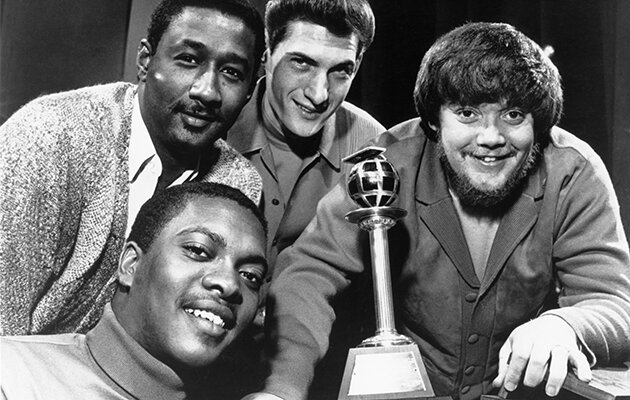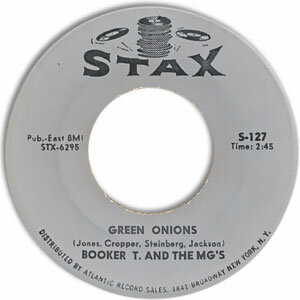
I was born in the ‘60s, a decade when records and radio waves were in perfect sync. You could hear every kind of music, at any time of day or night; all you had to do was cruise up and down the AM dial. We had a station in Chicago—WVON—that played great urban music. My dad listened to it regularly. He loved music, and music constantly filled the air in our house.

Back then, people collected 45 and LP records religiously, and even though by 1970 I was only nine years old, I was collecting musical memories of my own—like when my father, who had amassed an impressive library of blues 45s and LPs, played Side A of one particular 45 so often I came to memorize its every nuance and phrasing. The music was by Booker T. & the M.G.’s—one of the greatest R&B/soul rhythm sections in the history of American music. The track was “Green Onions,” an instrumental tune with not one word in it, but which possessed one of the most unforgettable grooves ever laid down on vinyl.
To this day, I can picture the gray label with the Stax logo, designed to look like discs stacked up like pancakes, shooting out on either side, and the weight of the records being such that they squash the Stax name down. I loved watching that 45 go ‘round and ‘round on our turntable—it seemed as if I could hear the music better that way.

Booker T. & the M.G.’s (M.G. stands for Memphis Group) was a quartet of incredibly tight musicians that included organist Booker T. Jones, guitarist Steve Cropper, bassist Lewie Steinberg then Donald “Duck” Dunn in 1965, and drummer Al Jackson Jr. During the ‘60s, the Hammond B3 organ was rising in popularity due to the surging influence of Blue Note Records’s now-legendary recording artist Jimmy Smith and the growing number of small jazz bars hiring organ trios to serve as house band. Jones’s Hammond didn’t sound quite the same as Smith’s—Jones’s was the M3 model, Smith the B3, which contributed to what became known as the “Memphis sound” for Stax Records.
I didn’t know it at the time, but my dad had a copy of the original Stax pressing of “Green Onions”, now long gone. Unfortunately, those pressings are hard to find these days. So imagine my surprise when I recently came across a copy on Discogs. I bought it on the spot! But there’s more to this story label-wise: The very first version of this 45 appeared in May 1962—not on Stax, but the Voltlabel [Volt 102], which was the sister label to Stax. Both Stax and Volt were owned by parent company Atlantic.
After the song became a hit, it didn’t take long for Stax to issue a new pressing three months later, in August 1962, which was the gray label my dad owned. Stax did a second pressing (the third issue, counting Volt), and this time the label on the record was more an eggshell blue color.

“Green Onions” is a twelve-bar blues chord progression that follows a mellow, medium tempo. This was ideal for me—I knew how to play a blues pentatonic scale (a musical scale of five notes per octave—ed.), and could solo right along with Jones, testament to how catchy and memorable the riff-based melody is. If you’ve ever heard “Green Onions”, you know what I mean by catchy and memorable. If you haven’t, you have no idea what you’ve been missing, and I urge you to listen to the track right now. I mean it. Because when you do, I have no doubt you’ll agree it’s one of the hookiest pieces of music you’ve ever heard.
One of the interesting things about the tune is that Jones himself never performs a solo on it—he just states the melody twice at the beginning and twice at the end. The twangy, sassy solo by guitarist Steve Cropper that follows Jones’s melody is what practically steals the show. He takes two full choruses of string-bending blues licks, then passes it back to Jones to play the melody, who gives it right back to Cropper. The band goes sailing into the fade-out as Cropper spews staccato bursts on his trusty Telecaster guitar. It’s a glorious ending to a great groove.

You wanna know a secret? It’s one I’ve kept for years—decades—but I’ll share it with you today: As great as “Green Onions” is, I assure you it’s not the best track on the 45. The truly amazing track is on Side B. Yes, you read me right—“Behave Yourself” is, in my opinion, the greasiest, tastiest dish on the platter.
The song drips like sweet molasses. Jones slowly introduces the understated melody with calm intensity—the tempo is more pensive and deliberate than probably anything you’ve heard. It’s a smoldering blues that slowly caresses your ears until suddenly you realize the entire “melody” is just one long blues pentatonic solo courtesy Jones. Unlike in “Green Onions,” he never passes the baton to anyone else in the band, and he never repeats one single phrase. Now, this is where you get to hear Booker T. Jones in all his splendor! Underneath Jones’s flighty fingers you hear the company of Cropper, Jackson, and Steinberg laying down the funkiest flow of soul music ever captured on vinyl. The song fades out with Jones doing a finger trill and a blues run that will make you drool.

This was just the beginning of the Memphis magic of Booker T. & the M.G.’s. Eventually, more songs from that band were blasting on the WVON station, sticking to my brain forever. In part II of my Magical 45’s series, I’ll share with you a few more tasty treats that found their way from the airwaves on to my turntable.
Until next time, keep on swingin’.
















Leave a Reply